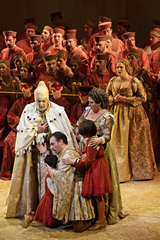| Opera Reviews | 6 May 2024 |
Domingo makes another role debut at La Scalaby Silvia Luraghi |
|
| Verdi: I due Foscari Teatro alla Scala, Milan 1 March 2016 |
|
|
In spite of this, the run of performances was not as successful as one might have expected, with some empty seats in various areas of the theater, as well as a somewhat muted enthusiasm, gave hints of the fact that the audience starts feeling that Domingo’s perennial career should perhaps head towards the end. The singer still relies on an authoritative stage presence, which represents a very good asset for the role of the old Venetian Doge Francesco Foscari, but at this point comparison with his younger self becomes disturbing, even though it must be said that he was vocally in good shape and especially his breathing was in a better condition with respect to other recent performances at La Scala. Early Verdi titles feature prominently in Italian opera seasons this year, and for this production the company cast tenor Francesco Meli, who returned to La Scala after the season opener Giovanna d’Arco, as the unhappy Jacopo Foscari. Meli started with some audible difficulties with the piani in his opening aria, and sounded more at ease further on, especially in the second act, but on the whole he was not as compelling as he had been as King Carlo in the preceding production. Soprano Anna Pirozzi as Lucrezia Contarini was a disappointment. Her sizeable voice does not seem to adapt to Verdi’s score, and she had to force the emission. The new production by Alvis Hermanis was puzzling. The stage remained mostly empty, and always with bright lights, which often contradicted the intended setting. At the opening of the second act, the dungeon in which Jacopo was having nightmares was an open space in daylight, with statues of winged lions moving around him. Some projections which showed renowned Venetian paintings remained out of context, and because members of the chorus remained motionless, the stage director also added a number of dancers to move and act in their stead. In the final act, the old Doge learns of the son’s death in a canopy bed in the middle of the stage, while Loredano laughs perfidiously on the side. The best notes came from the pit, where Maestro Michele Mariotti gave an accurate reading of the score, with a very good response from the orchestra.
|
|
| Text ©
Silvia Luraghi Photo © Teatro alla Scala |

 After over 46 years from his debut in December 1969, Plácido Domingo came back to La Scala in a new production of Giuseppe Verdi’s I due Foscari, and added one more of his baritone roles to his company repertoire. A pre-premiere meeting with the audience in the theater’s lounge saw a big number of would-be attendants trying to make their way into the house, with many remaining outside in the rain. There, the singer received the habitual appreciation from many long standing fans, some of them from abroad.
After over 46 years from his debut in December 1969, Plácido Domingo came back to La Scala in a new production of Giuseppe Verdi’s I due Foscari, and added one more of his baritone roles to his company repertoire. A pre-premiere meeting with the audience in the theater’s lounge saw a big number of would-be attendants trying to make their way into the house, with many remaining outside in the rain. There, the singer received the habitual appreciation from many long standing fans, some of them from abroad. 





